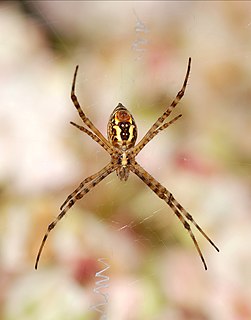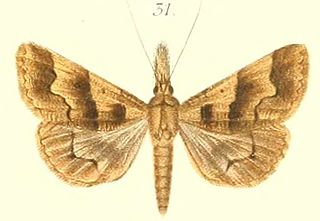
Dracaena trifasciata is a species of flowering plant in the family Asparagaceae, native to tropical West Africa from Nigeria east to the Congo. It is most commonly known as the snake plant, Saint George's sword, mother-in-law's tongue, and viper's bowstring hemp, among other names. Until 2017, it was known under the synonym Sansevieria trifasciata.

The golden coin turtle or Chinese three-striped box turtle is a species of turtle endemic to southern China and northern Vietnam.

Argiope trifasciata is a species of spider native to North and South America, but now found around the world. It can be found in certain areas of Europe, namely the Iberian Peninsula, the Canary Islands, and Madeira, The similar looking Argiope bruennichi is common in the Azores. Considered a pest in some areas, they typically begin to appear during autumn from early September to late October as temperatures start dropping.
Sacalia is a genus of turtles in the family Geoemydidae.

The Vietnamese three-striped box turtle or green rice turtle is a species of the Southeast Asian genus Cuora. It is distributed from the extreme southern part of the Chinese Guangxi Province southwards to central Vietnam and central Laos People's Democratic Republic. This species reaches up to 30 cm straight carapace length and is thus the largest Cuora species. Due to demand of traditional Chinese medicine, this species is nearly extinct in the wild, but is readily bred on Chinese turtle farms. Extremely high prices are paid for this species in China. It can be distinguished from Cuora trifasciata by its larger size and generally more oval or rounder shell, which is usually also flatter, a white, pink, or orange chin, and head coloration with an orange-brownish-olive dorsal head pattern and less black pigment.
Eugoa is a genus in the family Erebidae, subfamily Arctiinae. The genus was erected by Francis Walker in 1858. They are found in India, Sri Lanka, Myanmar and Borneo.
Teracotona is a genus of moths in the family Erebidae from the Afrotropics. The genus was erected by Arthur Gardiner Butler in 1878.

Ophyx is a genus of moths of the family Erebidae.

Timochares trifasciata, the many-banded skipper, is a butterfly in the family Hesperiidae. It is found from eastern and western Mexico to southern Brazil, Paraguay and Argentina.

Pitthea trifasciata is a moth of the family Geometridae first described by Hermann Dewitz in 1881.

Lamiini is a tribe of longhorn beetles of the subfamily Lamiinae.

Achthophora is a genus of longhorn beetles of the subfamily Lamiinae, containing the following species:

Choeromorpha is a genus of longhorn beetles of the subfamily Lamiinae, containing the following species:

Achthophora ferruginea is a species of beetle in the family Cerambycidae found in Asia. It is endemic to the Islands of the Philippines.
Achthophora tristis is a species of beetle in the family Cerambycidae found in Asia in countries such as the Philippines.

Achthophora annulicornis is a species of beetle in the family Cerambycidae. It was described by Heller in 1924.
Achthophora sandakana is a species of beetle in the family Cerambycidae. It was described by Heller in 1924. It is known from Borneo and Malaysia.
Achthophora costulata is a species of beetle in the family Cerambycidae. It was described by Heller in 1923. It is known from the Philippines.

Achthophora humeralis is a species of beetle in the family Cerambycidae. It was described by Heller in 1916, originally as the type species of the genus Dissomatus. It is known from the Philippines.
Achthophora lumawigi is a species of beetle in the family Cerambycidae. It was described by Stephan von Breuning in 1980. It is known from the Philippines.











